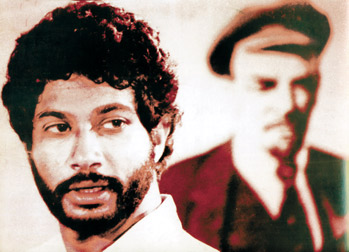Lester @ 91
 At the screening of "Gamperaliya" restored by French experts,
Director Lester James Peries had a question for Michel Lummkaux -
Ambassador for France in Sri Lanka: "Mr. Ambassador, you have restored
my film. Can't you restore me?" At the screening of "Gamperaliya" restored by French experts,
Director Lester James Peries had a question for Michel Lummkaux -
Ambassador for France in Sri Lanka: "Mr. Ambassador, you have restored
my film. Can't you restore me?"
The early Sinhala films were neither cinematic nor reflective of the
country's indigenous culture. Director Lester James Peries restored,
both the cinematic dynamism and the 'feel' of our own culture, to Sri
Lanka's film-making, when it was still an infant striving to lisp in
cinema.
Lester took Sinhala cinema to the world. He convinced the global film
community, that Sri Lanka, can produce cinematic works of undoubted
international quality.
When we celebrated the 91st birthday of Dr. Lester James Peries, all
Sri Lankans should congratulate themselves. We are very lucky, that we
are around to felicitate an outstanding genius of world cinema, who has
emerged from this little splendid isle.
In any worthwhile discourse on contemporary cinema, the name of
Director Lester James Peries, invariably occurs among the world's film
stalwarts.
Today, every aspect of Sri Lanka's film-making proclaims the
pervasive influence of Director Lester James Peries.
He introduced to Sri Lankan film-making, the essence and spirit of
cinematic conceptualization, as a mild revolutionary.
But, he was not a rebel by intention. His was rather a revolution by
default as it were.
The initial phase of the history of Sri Lankan film-making was
dominated by men and women of the legitimate theatre.
 |
|
Richerd de Zoyza
in a scene from Yuganthaya |
In the days of World War 2 and in the post-war days, the people of
Sri Lanka (generally speaking) experienced a feeling of affluence.
Employment was available to anyone, who wished it. But, the threat of
lurking death, brought on by war, persisted as a muted under tone of
society.
The combination of affluence and the ever-present threat of sudden
danger, compelled the masses to seek pleasure.
A hedonistic feel was in the air. They sought amusement. And, what
was most readily available was the popular theatre, which presented the
anachronistic theme - "Let us eat and drink today - for, tomorrow we
die."
The popular plays were a rage. But, live actors and actresses could
be present only in one place at a time. The arrival of the hard
Rupees-and cents decision to film then, plays and show them
simultaneously resulted in hundreds of venues.
This economic choice, resulted in heavily theatrical, cinematographer
plays, that, initially passed for cinema. They were largely the products
of formal studios. The makers of these "films," came from the theatre,
and were nourished by the grammar of stage plays.
While this was happening in Sri Lanka, young Lester was in England
making films.
His total career was shaped and dominated by cinematic discipline. He
joined Sri Lanka's Government Film Unit, and was overwhelmed by the
living, scenic cinema of his motherland.
He entered film-making, relying on outdoor shooting - to the shocked
dismay of some, who believed only in studio film-making. He entered a
remote Sri Lankan village with camera and crew and created his film
debut "Rekhava" (The Line of Destiny). (This may seem mildly reminiscent
of De Sila).
Lester ushered in a film tradition, that is at once Sinhala and
cinematic.
Initially, this may have elicited the resistance of those hardened
filmgoers, who were addicts of the "dance-song and action" formula.
But, in a quiet and subdued revolution, Lester's films brought about
a correction of taste. The climatic point in this new line of film
thought, was "Gamperaliya," which won the best film award at Indias
International Film Festival, way back in 1964.
His later works, accumulating into a body of creations, with a
personal distinction, ensured his entry into the coterie of world's
greatest film-makers.
In the 63-year-old history of Sri Lankan cinema, "Gamperaliya", still
occupies, unassailed, the position of being the greatest work produced
in the tradition of indigenous film-making. The ceremonial screening of
"Gamperaliya", restored by French experts, raises a whole series of
vital issues.
The greatest tribute, that the nation can pay Dr. Lester James Peries,
is taking to him the soul-elevating tidings that processes are under way
to explore the destiny of the series of cinematic works, he has endowed
upon mankind.
The current buzz phrase is "cinema-culture." On the 91st birthday of
Dr. Lester James Peries, a pragmatic step should be taken towards the
establishment of a Sri Lankan "cinema-culture," with Dr. Lester James
Peries' of creations as it's vital core.
On his 91st birthday, the best we can do to him is to bless him, for
blessing us by his eminent presence among us.
|

